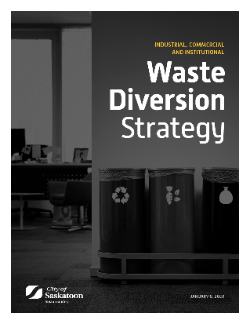Business Waste Diversion

Bylaw and Enforcement Update
All businesses and organizations in Saskatoon are required to separate recyclable materials from the garbage.
The recycling regulation means all businesses and organizations are required to:
- Have separate labelled containers for garbage and recycling.
- Educate employees and tenants annually about which materials are recyclable and how to sort them.
- Ensure recycling and garbage are removed and taken to an appropriate facility.
Enforcement for Business Recycling began in October 2023 after a full year of education to give businesses and organizations time to meet the new bylaw regulation. The Waste Bylaw
The education phase began for Business Organics in October 2023 for businesses and organizations that generate food or yard waste as part of their operations, such as restaurants and grocery stores. These businesses will be required to have separate bins to divert organics and recycling from the garbage.
The organics regulation means all businesses and organizations that generate food or yard waste as part of their operations are required to:
- Have separate labelled containers for garbage and organics
- Educate employees and tenants annually about which materials are organic and how to sort them
- Ensure organic waste is removed and taken to an appropriate facility
Enforcement for Business Organics will not begin until Fall 2024 to give businesses and organizations time to meet the new bylaw regulation.
Additional information about Business Organics education and enforcement was released to affected businesses in October 2023.
In early 2020, City Council approved a regulatory approach for recycling and organics for the Industrial, Commercial and Institutional (ICI) sector. With a phased-in approach beginning in 2022, all businesses and organizations are now required to have a separate container for recycling, and those that generate food or yard waste as part of their operations will be required to have a separate organics waste container.
The Timeline
In 2021 The Waste Bylaw was updated to include the ICI regulation based on the phased approach outlined below.
| Program | Phase | |
|---|---|---|
| January 2022 | Recycling | Education and assistance with early compliance |
| October 2023 | Recycling | Enforcement begins |
| July 2023 | Organics | Education and assistance with early compliance |
| October 2024 | Organics | Enforcement begins |
Recyclable Material
![]()
Organic Material
![]()
The Strategy
Engagement with Businesses and Organizations
As part of the YXE Talks Trash engagement series, City Administration engaged with 870 participants from businesses and organizations through workshops, online surveys, and face-to-face meetings to develop this approach. The engagement results and subsequent recommendations were presented to City Council in January 2020.
Why do we need this?
- Saskatoon’s businesses and organizations generate 68% of all garbage. 169,000 tonnes of waste go to Saskatoon and area landfills each year.
- 24% (23,900 tonnes) of garbage accepted by the City’s landfill in 2016 were from businesses and organizations. The remaining 145,100 tonnes of garbage were sent to privately operated landfills.
- 60% of this waste could be diverted from landfills. The highest diversion opportunities are: organic materials, recyclables, and construction and demolition waste.
- Businesses and organizations believe waste is the most important environmental issue. Main concerns include availability of recycling and too much garbage being sent to the landfill.
- Waste from businesses and organizations is managed differently. Private haulers collect waste from most businesses and organizations. Requirements for recycling and organics are unlikely to change who collects waste.
What can businesses and organizations do to help?
Creating an action plan using multiple strategies is the best way for businesses to reduce waste outputs. Below are five recommendations to assist you with increasing waste diversion rates in Saskatoon:
- Complete a Waste Audit
- Conducting an audit of your recycling, garbage, and/or organics, is a great tactic to help your business better understand waste habits and how to better manage it. This information will aid in sustainable improvements and efficiency.
- Standardize Waste Receptacles and Signage
- Consistency is key to keeping waste in its right place. Begin by standardizing recycling receptacles; keeping them all the same shape and colour within the organization. If you are required to make changes to the waste program on what is and is not accepted, ensure that users are informed and signage is updated and consistent.
- Focus on Efficiency with Set Goal
- Create logistics plans within your company that focus on efficiently reducing waste. Make changes that will benefit your company like creating a sustainability or procurement policy or implementing organics collection in your lunch areas. For accountability, set goals and report achievements.
- Reduce Waste Outputs
- The best approach to actively increasing waste diversion rates is following the first of the 3 R’s—Reduce. Focus should be placed on the purchases that are made in the supply stream before they enter your business. Investigate low-waste or alternative packaging options for consumables. Remember to reduce, then reuse, before you consider recycling.
- Read, Listen, & Share
- The recycling waste stream is dependent upon global markets and is prone to changes; affecting what is and is not accepted in our waste streams. Keep informed by frequently searching for reputable education sources and communicating with local waste specialists if you have questions. Don’t forget to share newly learned information with your colleagues.

